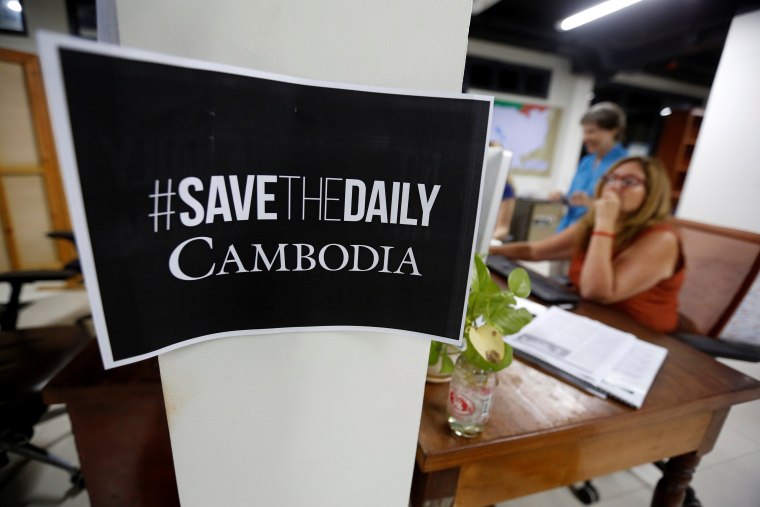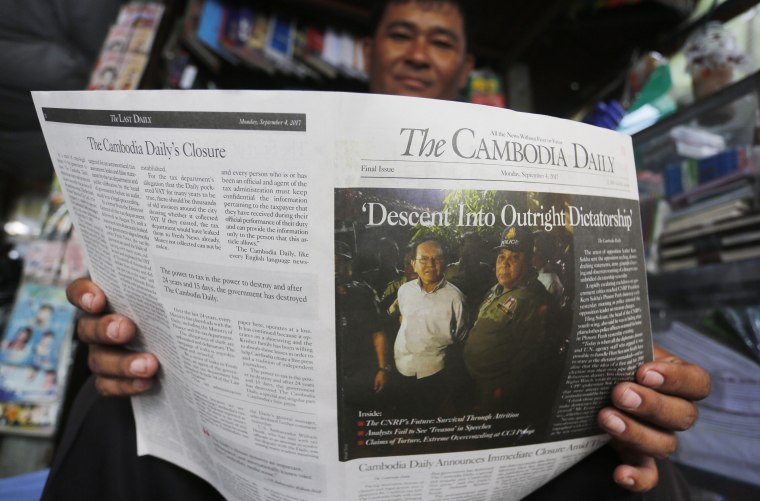One of Cambodia’s longest-running English-language newspapers has shuttered after its owners failed to meet a deadline to pay a tax bill imposed by the government that the publication has called politically motivated.
The Cambodia Daily printed its last edition on Monday, leading with a story headlined “Descent Into Outright Dictatorship” about the arrest of opposition leader Kem Sokha. It was forced to close after failing to pay a disputed $6.3 million back tax bill.
The newspaper was founded in 1993 by American journalist Bernard Krisher.
“It's a very sad time for all of us,” George Wright, an associate editor of the newspaper, told NBC News. “I particularly feel for the Cambodians, some of which worked here for two decades, who have to put their kids through school and are not sure what the immediate future holds.”

About half of the Cambodia Daily’s more than 30 journalists were Cambodian, according to Reuters.
Wright worked at the paper for four years, joining the staff after graduating from university in London.
“It really was my dream job,” he said. “From the age of 18, after coming here while doing the standard Southeast Asia backpacker route with mates from school, I knew I wanted to return here.”
“There's something about this country that just sticks,” he added.
Len Leng, a reporter who covered politics and social issues, told NBC News that the closing “completely devastated” her.
Interviewing Cambodian migrant workers had been a favorite assignment of hers, she said.

Human rights organizations say the closure of the newspaper is a threat to press freedom in the Southeast Asian country.
“The government’s targeting of the highly regarded Cambodia Daily is one of the gravest threats to freedom of the press in Cambodia since the 1991 Paris Peace Accords,” said Phil Robertson, deputy Asia director at Human Rights Watch, in a statement. “Cambodia’s donors should call upon the government to cease its legal actions against the Cambodia Daily until a legitimate audit of its alleged tax debt – that is conducted in an independent, fair, and timely manner – proves there is a genuine bill to be paid.”
The closure came a day after opposition leader Sokha was arrested on charges of conspiring with a foreign power. Leng was reporting the story with other staff members, she said.
It also comes weeks after authorities forced radio stations off the air, according to Reuters.

The U.S. Embassy in Phnom Penh posted a statement on Facebook about the closure.
“The Cambodia Daily’s hard-working, dedicated team of Khmer and Western reporters and staff provided insightful coverage that not only benefited Cambodia’s citizens, but also built an understanding of Cambodia around the world. This important voice is now lost,” the embassy said.
Calls to the Cambodian Embassy in Washington D.C. Wednesday rang unanswered.
Prime Minister Hun Sen, a former Khmer Rouge soldier who first came to power more than three decades ago, defended the tax bill to Reuters.
“When they didn’t pay and we asked them to leave the country, they said we are a dictatorship,” he said.
Wright said covering stories in the provinces will be what he misses most. He said he’s most proud of the stories he wrote about Montagnards, the indigenous peoples of the central highlands of Vietnam.
“The Montagnards are a forgotten people in the international community it seems, so having many of them thank me for giving them a voice through my reporting made it all worthwhile,” he said.
Leng hopes the newspaper makes a comeback in some form.
“I want the Daily to [have a] 'rebirth,' not for only me to resume reporting 'without fear or favor,' but [for its] readers who benefit a lot from the quality of the news reporting as well as English language enhancement,” she said, referencing the paper’s slogan.
Follow NBC Asian America on Facebook, Twitter, Instagram and Tumblr.
